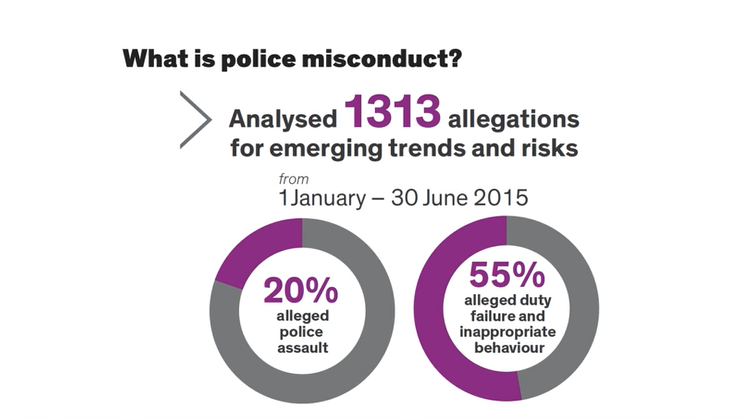IBAC reviewed four Victoria Police investigations into allegations police officers were falsifying Preliminary Breath Test results.
Reviews of police and public sector investigations
IBAC reviews police and public sector investigations into allegations of internal misconduct or corruption to ensure they are appropriately managed in accordance with public expectations. In particular, that investigations are thorough, impartial and timely, that findings are evidence-based and outcomes fair and reasonable.
Reviews can help identify corruption and misconduct risks, including systemic and organisational issues. IBAC routinely analyses findings across similar cases and makes recommendations to agencies about how to strengthen their corruption prevention policies and practices, and build their capacity to appropriately respond to complaints.
IBAC selects cases for review by considering:
- strategic focus areas and/or operational priorities for IBAC
- seriousness of the allegations and level or position of the personnel involved
- established patterns of behaviour or prior history
- whether the circumstances of the case are in the public interest, including where human rights issues arise
- any indication of systemic or organisational issues, including with workplace culture
- vulnerability of the complainant or affected person
- indications of bias during an investigation that may have affected the outcome
- whether natural justice was afforded to complainants, witnesses and/or subjects during the investigation process
- resources dedicated to the investigation (ie whether they were adequate and proportionate to the nature of the allegations).
General findings from IBAC reviews of public sector internal investigations
Although IBAC has not yet undertaken reviews of investigations across all sectors, reviews of public sector investigations demonstrate that organisations conducting internal investigations should consider the following:
- Documentation/evidence to demonstrate that an investigation was conducted by a suitably qualified, experienced and sufficiently impartial investigator.
- Conflicts of interest should be declared on investigation files.
- Where investigation reports make recommendations to an agency (such as to address deficiencies in a policy that created the opportunity for corruption to occur) those recommendations be adopted by the agency.
As part of this, it's important:
- evidence of improvements to the relevant systems/policies/procedures to prevent future occurrence is recorded
- if not implemented, the reasons for this decision are recorded by the agency
- sometimes further investigation is recommended beyond a preliminary enquiry. The agency should provide reasons if not pursuing further lines of enquiry. - Procedural fairness and due process should be provided to the subject of an investigation.
This includes:
- giving notice of allegations made against them
- giving them an opportunity to respond
- advising them of the outcome of the investigation. - Welfare checks and support should be provided when an employee is under investigation.
- The investigation process should be timely, with explanation for any delays.
- Evidence collected and relied upon for findings and outcomes should be recorded and able to be provided to oversight agencies (such as IBAC) for review.
- Agencies should have an investigation policy able to be provided to subjects of internal investigations or bodies such as IBAC.
IBAC reviews of police investigations
-
-
A review of two Victoria Police investigations into allegations of assault or excessive use of force by police officers against members of the public.
-
IBAC reviewed a Victoria Police investigation into allegations police assaulted a drug-affected 13-year-old girl at a suburban Melbourne police station.
The concerns were that:
- the member’s instinct to slap rather than subdue the young woman was inappropriate
- this action directly caused an avoidable escalation of violent conduct.
On review, we took issue with the police finding of ‘not substantiated’ and requested that Victoria Police take further action. Victoria Police subsequently advised the allegation of excessive force against a leading senior constable had been altered to ‘substantiated’ and appropriate management intervention had been undertaken.
-
We reviewed a police investigation into concerns about how police dealt with a man with disabilities.
It was alleged police assaulted the man during arrest. A Victoria Police investigation of the complaint found the police conduct was lawful, but also found the matter should be conciliated between the parties. We determined conciliation was not appropriate.
As a result, Victoria Police changed its finding. It also provided additional training to PSC officers who manage and coordinate responses to complainants and subject officers, and updated relevant processes.
-
IBAC reviewed a police investigation into how an overseas national was allegedly treated during arrest, transport and in custody.
This included allegations their phone calls were restricted and that police failed to recognise and address their mental health. We raised a range of issues with PSC, including:
- why a specific officer investigated the person’s complaint, despite a request they not be involved
- why the person was not contacted during the police investigation
- why station rules state only police will make a call for the prisoner. This was contrary to the Crimes Act 1958 which permits prisoners to make one call.
Victoria Police provided satisfactory responses, including revising the station’s procedures for prisoner’s use of the telephone.
-
In September 2011, a Victoria Police officer took her own life. Following the incident, information provided to Crime Stoppers raised concerns that she had been bullied in the workplace. Victoria Police’s subsequent investigation included an audit of police officers’ email records, which disclosed pornographic, racist and violent content. Discipline action was taken against nine officers.
We reviewed this case and determined that the investigation was adequately conducted. However, issues were identified with Victoria Police’s Email Assessment Matrix (EAM), a tool used to assess whether an email is inappropriate and which aims to apply a consistent standard during investigations. The EAM involves an examination of individual emails to assess the cumulative risk of an officer’s behaviour.
The review also disclosed that some officers were unaware of Victoria Police email policies.
In February 2014, we made a number of recommendations to Victoria Police to improve the EAM and address these concerns.
In March 2015, Victoria Police informed us that PSC had conducted additional training in relation to the emails policy and that a full review of the EAM tool had been undertaken.
-
A significant review, which was the subject of a special report to Parliament in February 2014, concerned previous OPI and Victorian Ombudsman reports into allegations about the conduct of a former Deputy Commissioner of Police, Sir Ken Jones QPM.
The review concluded that the evidence set out in the OPI report did not support an allegation that Sir Ken had engaged in serious misconduct by leaking or facilitating leaking to the media of confidential police information.
-
Bairnsdale Police Station social club racist stubby holders
IBAC reviewed a Victoria Police investigation into allegations that the Bairnsdale Police Station social club was improperly involved in the design, production and sale of racist ‘stubby holders’. The Victoria Police investigation of the allegations against members of the social club resulted in findings of ‘unsubstantiated’, except for one police officer, a former Senior Constable, against whom the allegation was ‘not proceeded with’.
IBAC found the investigation considered each alleged racist element of the stubby holders in isolation, and did not take into account the collective narrative of the design, which if read in sequence depicted the following:
- police member arrives at a call out in Bairnsdale
- member is called ‘Yadawg’ by an Indigenous person
- member deploys capsicum spray (‘Bairnsdale handshake’)
- the capsicum spray is implicated in the person catching alight (‘Not that flammable’)
- the member reports back to the station GOANODAAC (‘Gone on arrival, no offence detected, all apparently correct’).
We considered the Victoria Police conclusion that the terms used were not racist as contentious, and inconsistent with Victoria Police values.
On 16 January 2014, we recommended to the Chief Commissioner of Police that the outcome of the investigation be amended to ‘substantiated’ for the former senior constable and serving Sergeant, and that disciplinary proceedings be considered.
Victoria Police accepted the recommendation.
-
Police and victims of crime assistance
In 2013, IBAC reviewed an OPI investigation, Operation Cobalt, into the alleged improper involvement of police officers in applications to the Victims of Crime Assistance Tribunal (VOCAT).
As a result of the review, IBAC confirmed a practice within sections of Victoria Police (first identified by OPI) of:
- applying for victims of crime assistance for injuries incurred in the course of their duties, which may be inappropriate and which may conflict with other processes such as WorkSafe compensation
- receiving applications to VOCAT on behalf of victims of crime, and referring those applications to select solicitors who are former Victoria Police officers.
We brought the matter to the attention of the Chief Commissioner of Police in July 2013 and recommended Victoria Police consider the relevant policy to ensure:
- clear advice on whether or not members may assist victims of crime to submit applications to VOCAT
- a consistent process to any referral of applications to solicitors, with controls to prevent restrictive and inappropriate referral practices
- applications by police for victims of crime assistance to be subject to independent review
- the entitlements of police injured in the course of duty – including victims of crime assistance – to be clearly outlined.
We also identified risks to VOCAT, particularly fraudulent, corrupt or improper practices. These risks were brought to the attention of the Secretary of the Department of Justice (DOJ) in July 2013. Both DOJ and VOCAT were offered an opportunity to engage with us in responding to the issues.
-
Allegations of unlawful assault, disgraceful conduct, racial discrimination and failure to comply with police manual
IBAC conducted a review of a 2009 incident in which eight Victoria Police officers were involved in apprehending, arresting and detaining suspected juvenile offenders in Williamstown.
We identified a range of deficiencies in the way that Victoria Police handled this matter We also identified racist statements in emails between some officers involved in this matter, which indicated systemic issues relating to racism.
PSC acknowledged the inappropriate behaviour of the officers involved (who have since been provided with workplace guidance and training in the Charter of Human Rights and Responsibilities).
Victoria Police has also outlined its commitment towards better community engagement and cross cultural awareness through its 2013 Equality is not the same report.



